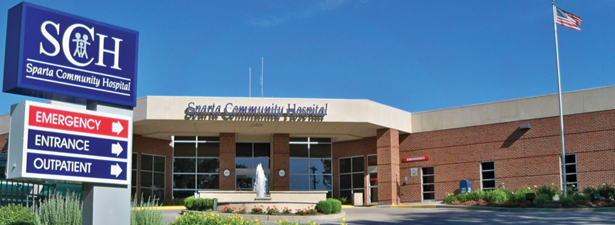Sparta Community Hospital
Expanding Care Through Rural Health Clinics

Before 2020, Sparta Community Hospital saw average drug cost savings of $1.3 million per year, thanks to the federal 340B drug discount program, which requires pharmaceutical companies to sell drugs at a discount to hospitals and other healthcare organizations that care for uninsured and low-income patients.
With those savings, the hospital has hired five additional full-time clinicians and several part-time specialty providers for its Rural Health Clinics since 2013, resulting in a 21% increase in patient visits between 2013 and 2023.
Among other investments in patients, the 340B program has been a significant funding source for the hospital’s clinics in and around Sparta, a rural city of nearly 4,200 people located about 50 miles southeast of St. Louis. Nearly 12% of Sparta residents live in poverty.
For this fiscal year ending in June, hospital leaders project only $260,000 in drug cost savings—an astounding 80% drop—since pharmaceutical companies began placing restrictions on 340B hospitals in 2020. Counter to the intent of 340B, which began in 1992, drugmakers have been limiting or placing conditions on the ability of 340B hospitals to distribute discounted drugs through contract pharmacies.
Numerous drug manufacturers have added restrictions that prevent Sparta Community Hospital from purchasing and dispensing drugs through contractual arrangements with retail pharmacies.
“This current fiscal year has experienced the most negative impact from PhRMA restrictions,” the hospital said. “The current state of our 340B program will not be able to subsidize our clinic losses. This will inevitably reduce our ability to provide services in our clinics and access to care.”
In addition to caring for more patients in its clinics, Sparta Community Hospital also put 340B savings toward:
-
A community benefit program with two local contract pharmacies that allows uninsured patients to acquire medications at 340B cost plus the agreed-upon pharmacy dispensing fee; and
-
Decreasing patient charges for drugs acquired through the 340B program and administered in the hospital, which has resulted in savings for payors and patients.
At a time when hospitals face mounting cost pressures, including labor and supply costs, the 340B program has been a lifeline for both patients and hospitals. Because 340B savings have helped subsidize Sparta Community Hospital’s clinics, the hospital has been able to contract with more payors that historically don’t reimburse at rates high enough to cover the cost of providing care. Such a move is a reflection of the importance of the 340B program and Sparta Community Hospital’s commitment to its mission “to improve the wellness of our communities by providing and coordinating compassionate value-based health services.”

